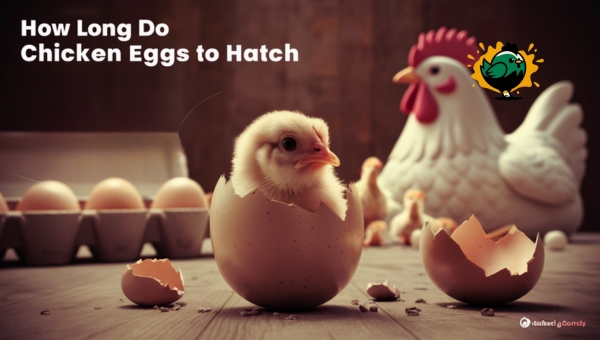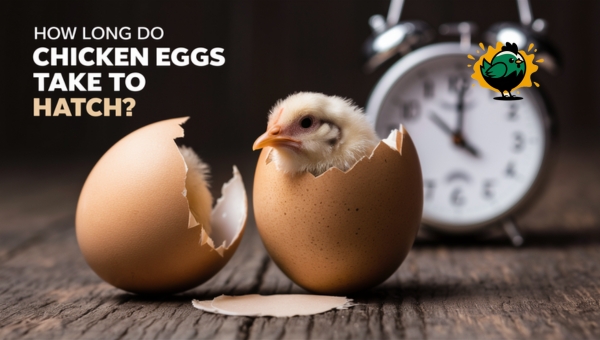How Long Do Chicken Eggs Take to Hatch – Egg Hatching Guide

Holding a warm egg, knowing that it contains the miracle of life. Chicken egg hatching is an incredible process that has fascinated humans for centuries. As the days pass, the egg transforms, and soon a chick emerges, ready to take on the world.
For those eager to explore this captivating journey, understanding the nuances of chicken egg hatching is key. From the timeline to the factors that influence hatching, each step is a crucial part of nature’s wondrous cycle. In this article, we’ll delve into the nitty-gritty of hatching eggs, ensuring you’re well-equipped to witness this marvel firsthand.
How Long Do Chicken Eggs Take To Hatch?
Chicken egg hatching typically takes about 21 days from the time they are set in the incubator. This period can vary slightly depending on several factors, but 21 days is the standard timeframe. During this period, it is crucial to maintain the right conditions for the eggs to develop properly.

The incubation process requires consistent temperature and humidity levels, and the eggs must be rotated regularly to ensure even development.
The temperature should ideally be kept at around 99.5°F (37.5°C) and humidity at about 50-55% during the first 18 days. In the final three days, humidity should be increased to 65-70% to aid in the hatching process.
Factors Influencing Hatching Time
Chicken egg hatching is a fascinating process influenced by several key factors. Understanding these elements is crucial for anyone looking to achieve successful hatching. We’ll explore the significance of temperature, humidity, and egg rotation in this journey.

Each of these factors plays a vital role in ensuring that eggs develop properly and hatch on time. Let’s dive into each one to see how they impact the hatching process.
Temperature Control
Maintaining the correct temperature is essential for the successful hatching of chicken eggs.
Here are the key aspects to consider:
- Optimal Temperature Range: Chicken eggs need a consistent temperature, typically around 99.5°F (37.5°C), to develop properly. Deviations from this range can affect the embryo’s growth.
- Temperature Fluctuations: Sudden changes in temperature can be harmful, potentially leading to delayed hatching or weakening of the chicks. It’s important to monitor and maintain a stable environment.
- Incubator Settings: Using a reliable incubator with precise temperature settings is crucial. Regularly check the temperature to prevent any discrepancies.
- Thermometer Use: Place a quality thermometer inside the incubator to ensure accurate readings and make adjustments as needed.
Humidity Levels
The role of humidity in chicken egg hatching is equally important. Here are some key points to keep in mind:
- Ideal Humidity Levels: During the incubation period, humidity should be maintained between 40-50% and increased to 65-75% during the last few days before hatching.
- Impact on Development: Proper humidity ensures the egg’s moisture content is balanced, preventing dehydration or excess moisture, which can hinder hatching.
- Measuring Humidity: Use a hygrometer to monitor humidity levels within the incubator and adjust as necessary to maintain the ideal range.
- Water Source: Ensure there is a water source inside the incubator to help regulate humidity, such as a small dish of water.
Egg Rotation
Rotating eggs is a crucial practice to ensure the healthy development of embryos. Here’s why egg rotation matters:
- Prevention of Adhesion: Regularly turning the eggs, typically three to five times a day, prevents the embryo from sticking to the shell’s inner membrane.
- Even Development: Rotation helps distribute heat evenly, promoting uniform development across the entire egg.
- Automatic Turners: Consider using an automatic egg turner in the incubator to ensure consistent and precise rotation, reducing the risk of human error.
- Manual Turning: If done manually, mark the eggs to keep track of rotations and ensure each egg is turned the right number of times daily.
Also Read: Pine Chips for Chickens | The Ultimate Bedding Solution
Troubleshooting Delays in Hatching
When it comes to chicken egg hatching, delays can be a cause for concern. Understanding common issues and knowing when to seek help can be crucial for successful hatching. In the following sections, we’ll explore typical problems that might cause delays and provide practical solutions.

Additionally, we’ll discuss the appropriate times to consider intervention if the hatching process doesn’t proceed as expected.
Common Issues and Solutions
Identifying problems early can prevent prolonged delays in egg hatching. Here are some frequent issues and their solutions:
- Temperature Fluctuations: Ensure the incubator maintains a steady temperature. Use a reliable thermometer to monitor changes and adjust settings as needed.
- Inadequate Humidity: Maintain proper humidity levels. Use a hygrometer to check and regulate moisture.
- Egg Positioning: Eggs should be positioned correctly, with the larger end facing up. Rotate eggs gently to prevent the embryo from sticking to the shell.
When to Seek Help
Knowing when to intervene can make a difference:
- Prolonged Delays: If hatching exceeds a day or two beyond the 21-day mark, consider seeking advice from an experienced breeder or veterinarian.
- Embryo Movement: If there’s no visible movement or sound after the expected hatching period, professional help might be necessary.
- Unusual Conditions: Any signs of abnormal development or issues with multiple eggs should prompt consultation with experts.
Also Read: Chicken Duckling Secrets | The Perfect Hybrid Guide
Tips for Successful Hatching
Here are some key points to consider:

- Select quality eggs: Begin with healthy, fertile eggs for a higher success rate.
- Temperature control: Maintain a steady temperature of around 99.5°F (37.5°C) in the incubator.
- Humidity management: Keep humidity levels at 40-50% for the first 18 days, increasing to 65-75% for the final days.
- Regular egg rotation: Turn the eggs at least three times a day to ensure even development.
- Incubator cleanliness: Ensure the incubator is clean and sanitized to prevent contamination.
- Candling eggs: Check the eggs’ development by candling around days 7 and 14 to monitor progress.
- Patience and care: Avoid opening the incubator too often to maintain consistent conditions.
FAQs
What temperature is ideal for hatching chicken eggs?
The ideal temperature for hatching chicken eggs is approximately 99.5 degrees Fahrenheit. Maintaining this constant temperature is crucial for the development of the embryos. Any fluctuations in temperature can lead to delays or unsuccessful hatching.
How does humidity affect chicken egg hatching?
Humidity levels play a vital role in chicken egg hatching. It should be around 50-55% during the first 18 days and increased to 65-70% in the final days. Proper humidity ensures the chicks develop correctly and can break through the shell.
Why is it necessary to rotate chicken eggs during incubation?
Rotating chicken eggs during incubation is necessary to ensure even development. This process prevents the embryo from sticking to the eggshell and helps distribute heat evenly. Eggs should be rotated several times a day for optimal results.
What should I do if my eggs are not hatching on time?
If your eggs are not hatching on time, check temperature and humidity settings first. Ensure that the incubator is functioning properly. If you’re unsure, consulting with an expert may provide insights into potential issues.
Conclusion
Chicken egg hatching is a fascinating process that requires careful attention to various factors. Understanding the timeline and the conditions needed for successful hatching can lead to a rewarding experience. Maintaining the right temperature, humidity levels, and regular egg rotation are crucial steps in ensuring a healthy hatch.
Troubleshooting common issues and knowing when to seek help can make a significant difference in outcomes. Following these guidelines will improve the chances of successful egg hatching.
If you found this information helpful, explore more insightful articles on our site to enhance your poultry knowledge and skills!
